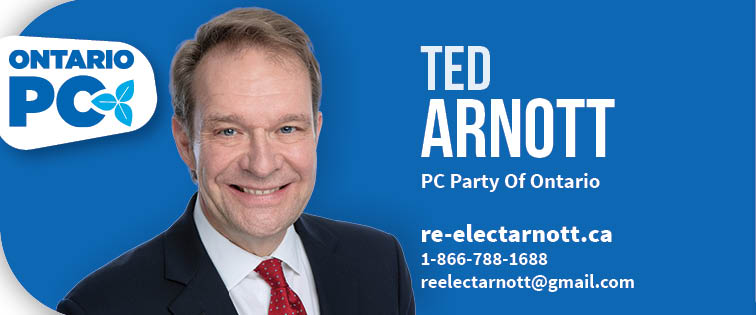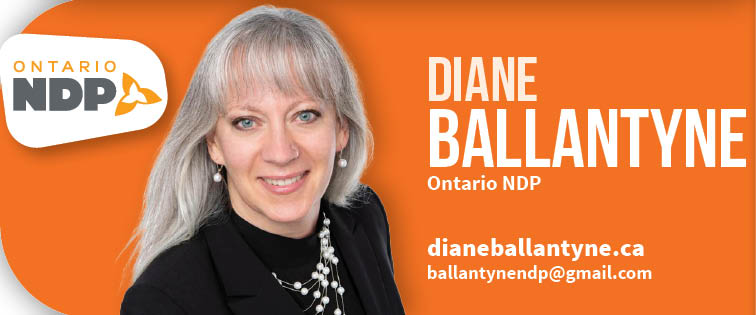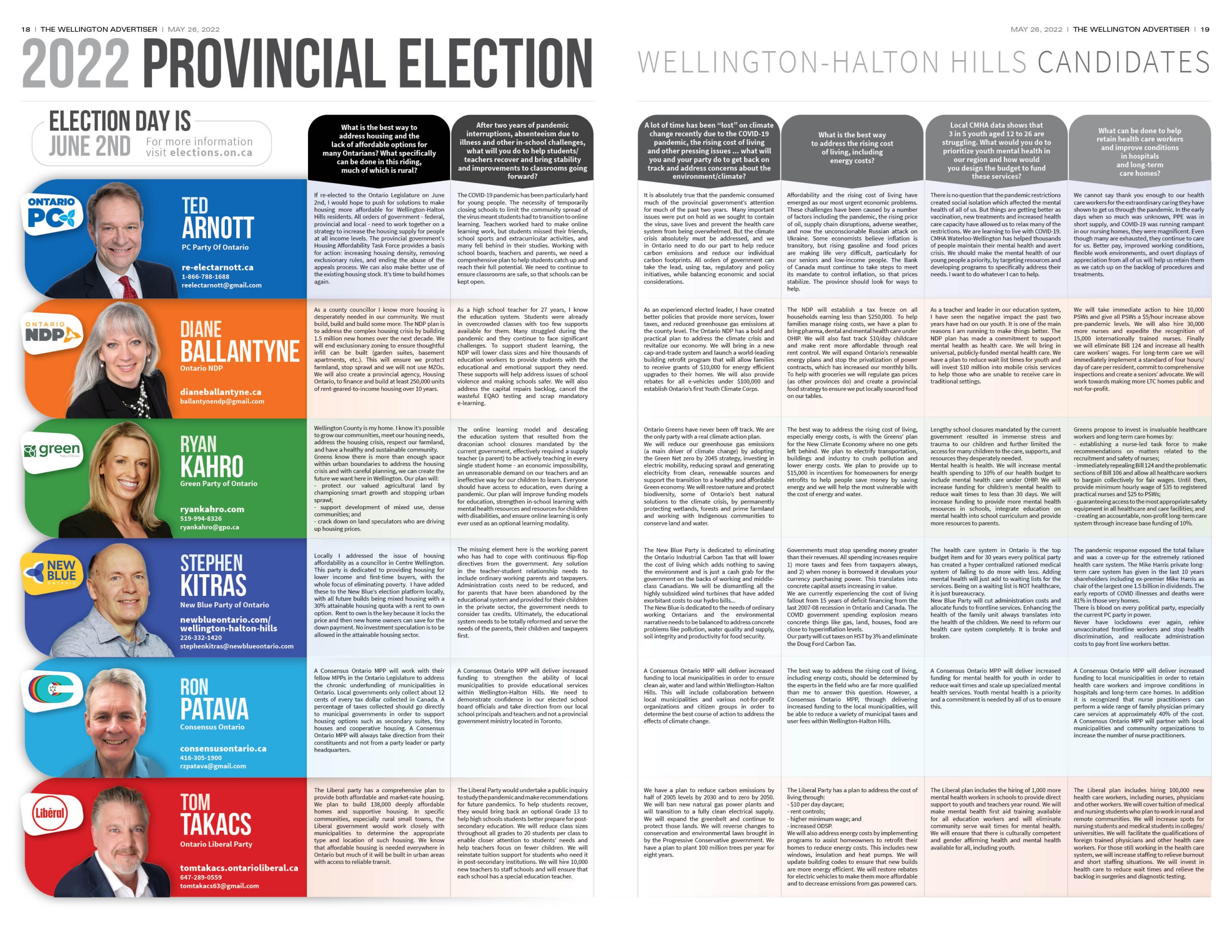WELLINGTON-HALTON HILLS – As part of the Wellington Advertiser’s coverage of the 2022 provincial election, the newspaper offered all local candidates a chance to participate in a Q&A feature leading up to the June 2 election.

What is the best way to address housing and the lack of affordable options form any Ontarians? What specifically can be done in this riding, much of which is rural?
If re-elected to the Ontario Legislature on June 2nd, I would hope to push for solutions to make housing more affordable for Wellington-Halton Hills residents. All orders of government – federal, provincial and local – need to work together on a strategy to increase the housing supply for people at all income levels. The provincial government’s Housing Affordability Task Force provides a basis for action: increasing housing density, removing exclusionary rules, and ending the abuse of the appeals process. We can also make better use of the existing housing stock. It’s time to build homes again.
After two years of pandemic interruptions, absenteeism due to illness and other in-school challenges, what will you do to help students/teachers recover and bring stability and improvements to classrooms going forward?
The COVID-19 pandemic has been particularly hard for young people. The necessity of temporarily closing schools to limit the community spread of the virus meant students had to transition to online learning. Teachers worked hard to make online learning work, but students missed their friends, school sports and extracurricular activities, and many fell behind in their studies. Working with school boards, teachers and parents, we need a comprehensive plan to help students catch up and reach their full potential. We need to continue to ensure classrooms are safe, so that schools can be kept open.
A lot of time has been “lost” on climate change recently due to the COVID-19 pandemic, the rising cost of living and other pressing issues … what will you and your party do to get back on track and address concerns about the environment/climate?
It is absolutely true that the pandemic consumed much of the provincial government’s attention for much of the past two years. Many important issues were put on hold as we sought to contain the virus, save lives and prevent the health care system from being overwhelmed. But the climate crisis absolutely must be addressed, and we in Ontario need to do our part to help reduce carbon emissions and reduce our individual carbon footprints. All orders of government can take the lead, using tax, regulatory and policy initiatives, while balancing economic and social considerations.
What is the best way to address the rising cost of living, including energy costs?
Affordability and the rising cost of living have emerged as our most urgent economic problems. These challenges have been caused by a number of factors including the pandemic, the rising price of oil, supply chain disruptions, adverse weather, and now the unconscionable Russian attack on Ukraine. Some economists believe inflation is transitory, but rising gasoline and food prices are making life very difficult, particularly for our seniors and low-income people. The Bank of Canada must continue to take steps to meet its mandate to control inflation, so that prices stabilize. The province should look for ways to help.
Local CMHA data shows that3 in 5 youth aged 12 to 26 are struggling. What would you do to prioritize youth mental health in our region and how would you design the budget to fund these services?
There is no question that the pandemic restrictions created social isolation which affected the mental health of all of us. But things are getting better as vaccination, new treatments and increased health care capacity have allowed us to relax many of the restrictions. We are learning to live with COVID-19. CMHA Waterloo-Wellington has helped thousands of people maintain their mental health and avert crisis. We should make the mental health of our young people a priority, by targeting resources and developing programs to specifically address their needs. I want to do whatever I can to help.
What can be done to help retain health care workers and improve conditions in hospitals and long-term care homes?
We cannot say thank you enough to our health care workers for the extraordinary caring they have shown to get us through the pandemic. In the early days when so much was unknown, PPE was in short supply, and COVID-19 was running rampant in our nursing homes, they were magnificent. Even though many are exhausted, they continue to care for us. Better pay, improved working conditions, flexible work environments, and overt displays of appreciation from all of us will help us retain them as we catch up on the backlog of procedures and treatments.

What is the best way to address housing and the lack of affordable options for many Ontarians? What specifically can be done in this riding, much of which is rural?
As a county councillor I know more housing is desperately needed in our community. We must build, build and build some more. The NDP plan is to address the complex housing crisis by building 1.5 million new homes over the next decade. We will end exclusionary zoning to ensure thoughtful infill can be built (garden suites, basement apartments, etc.). This will ensure we protect farmland, stop sprawl and we will not use MZOs. We will also create a provincial agency, Housing Ontario, to finance and build at least 250,000 units of rent-geared-to-income housing over 10 years.
After two years of pandemic interruptions, absenteeism due to illness and other in-school challenges, what will you do to help students/teachers recover and bring stability and improvements to classrooms going forward?
As a high school teacher for 27 years, I know the education system. Students were already in overcrowded classes with too few supports available for them. Many struggled during the pandemic and they continue to face significant challenges. To support student learning, the NDP will lower class sizes and hire thousands of education workers to provide students with the educational and emotional support they need. These supports will help address issues of school violence and making schools safer. We will also address the capital repairs backlog, cancel the wasteful EQAO testing and scrap mandatory e-learning.
A lot of time has been “lost” on climate change recently due to the COVID-19 pandemic, the rising cost of living and other pressing issues … what will you and your party do to get back on track and address concerns about the environment/climate?
As an experienced elected leader, I have created better policies that provide more services, lower taxes, and reduced greenhouse gas emissions at the county level. The Ontario NDP has a bold and practical plan to address the climate crisis and revitalize our economy. We will bring in a new cap-and-trade system and launch a world-leading building retrofit program that will allow families to receive grants of $10,000 for energy efficient upgrades to their homes. We will also provide rebates for all e-vehicles under $100,000 and establish Ontario’s first Youth Climate Corps.
What is the best way to address the rising cost of living, including energy costs?
The NDP will establish a tax freeze on all households earning less than $250,000. To help families manage rising costs, we have a plan to bring pharma, dental and mental health care under OHIP. We will also fast track $10/day childcare and make rent more affordable through real rent control. We will expand Ontario’s renewable energy plans and stop the privatization of power contracts, which has increased our monthly bills. To help with groceries we will regulate gas prices (as other provinces do) and create a provincial food strategy to ensure we put locally sourced food on our tables.
Local CMHA data shows that3 in 5 youth aged 12 to 26 are struggling. What would you do to prioritize youth mental health in our region and how would you design the budget to fund these services?
As a teacher and leader in our education system, I have seen the negative impact the past two years have had on our youth. It is one of the main reasons I am running to make things better. The NDP plan has made a commitment to support mental health as health care. We will bring in universal, publicly-funded mental health care. We have a plan to reduce wait list times for youth and will invest $10 million into mobile crisis services to help those who are unable to receive care in traditional settings.
What can be done to help retain health care workers and improve conditions in hospitals and long-term care homes?
We will take immediate action to hire 10,000 PSWs and give all PSWs a $5/hour increase above pre-pandemic levels. We will also hire 30,000 more nurses and expedite the recognition of 15,000 internationally trained nurses. Finally we will eliminate Bill 124 and increase all health care workers’ wages. For long-term care we will immediately implement a standard of four hours/day of care per resident, commit to comprehensive inspections and create a seniors’ advocate. We will work towards making more LTC homes public and not-for-profit.

What is the best way to address housing and the lack of affordable options form any Ontarians? What specifically can be done in this riding, much of which is rural?
Wellington County is my home. I know it’s possible to grow our communities, meet our housing needs, address the housing crisis, respect our farmland, and have a healthy and sustainable community.
Greens know there is more than enough space within urban boundaries to address the housing crisis and with careful planning, we can create the future we want here in Wellington. Our plan will:
– protect our valued agricultural land by championing smart growth and stopping urban sprawl;
– support development of mixed use, dense communities; and
– crack down on land speculators who are driving up housing prices.
After two years of pandemic interruptions, absenteeism due to illness and other in-school challenges, what will you do to help students/teachers recover and bring stability and improvements to classrooms going forward?
The online learning model and descaling the education system that resulted from the draconian school closures mandated by the current government, effectively required a supply teacher (a parent) to be actively teaching in every single student home – an economic impossibility, an unreasonable demand on our teachers and an ineffective way for our children to learn. Everyone should have access to education, even during a pandemic. Our plan will improve funding models for education, strengthen in-school learning with mental health resources and resources for children with disabilities, and ensure online learning is only ever used as an optional learning modality.
A lot of time has been “lost” on climate change recently due to the COVID-19 pandemic, the rising cost of living and other pressing issues … what will you and your party do to get back on track and address concerns about the environment/climate?
Ontario Greens have never been off track. We are the only party with a real climate action plan.
We will reduce our greenhouse gas emissions (a main driver of climate change) by adopting the Green Net zero by 2045 strategy, investing in electric mobility, reducing sprawl and generating electricity from clean, renewable sources and support the transition to a healthy and affordable Green economy. We will restore nature and protect biodiversity, some of Ontario’s best natural solutions to the climate crisis, by permanently protecting wetlands, forests and prime farmland and working with Indigenous communities to conserve land and water.
What is the best way to address the rising cost of living, including energy costs?
The best way to address the rising cost of living, especially energy costs, is with the Greens’ plan for the New Climate Economy where no one gets left behind. We plan to electrify transportation, buildings and industry to crush pollution and lower energy costs. We plan to provide up to $15,000 in incentives for homeowners for energy retrofits to help people save money by saving energy and we will help the most vulnerable with the cost of energy and water.
Local CMHA data shows that3 in 5 youth aged 12 to 26 are struggling. What would you do to prioritize youth mental health in our region and how would you design the budget to fund these services?
Lengthy school closures mandated by the current government resulted in immense stress and trauma to our children and further limited the access for many children to the care, supports, and resources they desperately needed.
Mental health is health. We will increase mental health spending to 10% of our health budget to include mental health care under OHIP. We will increase funding for children’s mental health to reduce wait times to less than 30 days. We will increase funding to provide more mental health resources in schools, integrate education on mental health into school curriculum and provide more resources to parents.
What can be done to help retain health care workers and improve conditions in hospitals and long-term care homes?
Greens propose to invest in invaluable healthcare workers and long-term care homes by:
– establishing a nurse-led task force to make recommendations on matters related to the recruitment and safety of nurses;
– immediately repealing Bill 124 and the problematic sections of Bill 106 and allow all healthcare workers to bargain collectively for fair wages. Until then, provide minimum hourly wage of $35 to registered practical nurses and $25 to PSWs;
– guaranteeing access to the most appropriate safety equipment in all healthcare and care facilities; and
– creating an accountable, non-profit long-term care system through increase base funding of 10%.

What is the best way to address housing and the lack of affordable options form any Ontarians? What specifically can be done in this riding, much of which is rural?
Locally I addressed the issue of housing affordability as a councillor in Centre Wellington. This party is dedicated to providing housing for lower income and first-time buyers, with the whole focus of eliminating poverty. I have added these to the New Blue’s election platform locally, with all future builds being mixed housing with a 30% attainable housing quota with a rent to own option. Rent to own is the key because it locks the price and then new home owners can save for the down payment. No investment speculation is to be allowed in the attainable housing sector.
After two years of pandemic interruptions, absenteeism due to illness and other in-school challenges, what will you do to help students/teachers recover and bring stability and improvements to classrooms going forward?
The missing element here is the working parent who has had to cope with continuous flip-flop directives from the government. Any solution in the teacher-student relationship needs to include ordinary working parents and taxpayers. Administration costs need to be reduced, and for parents that have been abandoned by the educational system and provided for their children in the private sector, the government needs to consider tax credits. Ultimately, the educational system needs to be totally reformed and serve the needs of the parents, their children and taxpayers first.
A lot of time has been “lost” on climate change recently due to the COVID-19 pandemic, the rising cost of living and other pressing issues … what will you and your party do to get back on track and address concerns about the environment/climate?
The New Blue Party is dedicated to eliminating the Ontario Industrial Carbon Tax that will lower the cost of living which adds nothing to saving the environment and is just a cash grab for the government on the backs of working and middle-class Canadians. We will be dismantling all the highly subsidized wind turbines that have added exorbitant costs to our hydro bills…
The New Blue is dedicated to the needs of ordinary working Ontarians and the environmental narrative needs to be balanced to address concrete problems like pollution, water quality and supply, soil integrity and productivity for food security.
What is the best way to address the rising cost of living, including energy costs?
Governments must stop spending money greater than their revenues. All spending increases require 1) more taxes and fees from taxpayers always, and 2) when money is borrowed it devalues your currency purchasing power. This translates into concrete capital assets increasing in value.
We are currently experiencing the cost of living fallout from 15 years of deficit financing from the last 2007-08 recession in Ontario and Canada. The COVID government spending explosion means concrete things like gas, land, houses, food are close to hyperinflation levels.
Our party will cut taxes on HST by 3% and eliminate the Doug Ford Carbon Tax.
Local CMHA data shows that3 in 5 youth aged 12 to 26 are struggling. What would you do to prioritize youth mental health in our region and how would you design the budget to fund these services?
The health care system in Ontario is the top budget item and for 30 years every political party has created a hyper centralized rationed medical system of failing to do more with less. Adding mental health will just add to waiting lists for the services. Being on a waiting list is NOT healthcare, it is just bureaucracy.
New Blue Party will cut administration costs and allocate funds to frontline services. Enhancing the health of the family unit always translates into the health of the children. We need to reform our health care system completely. It is broke and broken.
What can be done to help retain health care workers and improve conditions in hospitals and long-term care homes?
The pandemic response exposed the total failure and was a cover-up for the extremely rationed health care system. The Mike Harris private long-term care system has given in the last 10 years shareholders including ex-premier Mike Harris as chair of the largest one 1.5 billion in dividends. The early reports of COVID illnesses and deaths were 81% in those very homes.
There is blood on every political party, especially the current PC party in power.
Never have lockdowns ever again, rehire unvaccinated frontline workers and stop health discrimination, and reallocate administration costs to pay front line workers better.

What is the best way to address housing and the lack of affordable options form any Ontarians? What specifically can be done in this riding, much of which is rural?
A Consensus Ontario MPP will work with their fellow MPPs in the Ontario Legislature to address the chronic underfunding of municipalities in Ontario. Local governments only collect about 12 cents of every tax dollar collected in Canada. A percentage of taxes collected should go directly to municipal governments in order to support housing options such as secondary suites, tiny houses and cooperative housing. A Consensus Ontario MPP will always take direction from their constituents and not from a party leader or party headquarters.
After two years of pandemic interruptions, absenteeism due to illness and other in-school challenges, what will you do to help students/teachers recover and bring stability and improvements to classrooms going forward?
A Consensus Ontario MPP will deliver increased funding to strengthen the ability of local municipalities to provide educational services within Wellington-Halton Hills. We need to demonstrate confidence in our elected school board officials and take direction from our local school principals and teachers and not a provincial government ministry located in Toronto.
A lot of time has been “lost” on climate change recently due to the COVID-19 pandemic, the rising cost of living and other pressing issues … what will you and your party do to get back on track and address concerns about the environment/climate?
A Consensus Ontario MPP will deliver increased funding to local municipalities in order to ensure clean air, water and land within Wellington-Halton Hills. This will include collaboration between local municipalities and various not-for-profit organizations and citizen groups in order to determine the best course of action to address the effects of climate change.
What is the best way to address the rising cost of living, including energy costs?
The best way to address the rising cost of living, including energy costs, should be determined by the experts in the field who are far more qualified than me to answer this question. However, a Consensus Ontario MPP, through delivering increased funding to the local municipalities, will be able to reduce a variety of municipal taxes and user fees within Wellington-Halton Hills.
Local CMHA data shows that3 in 5 youth aged 12 to 26 are struggling. What would you do to prioritize youth mental health in our region and how would you design the budget to fund these services?
A Consensus Ontario MPP will deliver increased funding for mental health for youth in order to reduce wait times and scale up specialized mental health services. Youth mental health is a priority and a commitment is needed by all of us to ensure this.
What can be done to help retain health care workers and improve conditions in hospitals and long-term care homes?
A Consensus Ontario MPP will deliver increased funding to local municipalities in order to retain health care workers and improve conditions in hospitals and long-term care homes. In addition it is recognized that nurse practitioners can perform a wide range of family physician primary care services at approximately 40% of the cost. A Consensus Ontario MPP will partner with local municipalities and community organizations to increase the number of nurse practitioners.

What is the best way to address housing and the lack of affordable options form any Ontarians? What specifically can be done in this riding, much of which is rural?
The Liberal party has a comprehensive plan to provide both affordable and market-rate housing. We plan to build 138,000 deeply affordable homes and supportive housing. In specific communities, especially rural small towns, the Liberal government would work closely with municipalities to determine the appropriate type and location of such housing. We know that affordable housing is needed everywhere in Ontario but much of it will be built in urban areas with access to reliable transit.
After two years of pandemic interruptions, absenteeism due to illness and other in-school challenges, what will you do to help students/teachers recover and bring stability and improvements to classrooms going forward?
The Liberal Party would undertake a public inquiry to study the pandemic and make recommendations for future pandemics. To help students recover, they would bring back an optional Grade 13 to help high schools students better prepare for post-secondary education. We will reduce class sizes throughout all grades to 20 students per class to enable closer attention to students’ needs and help teachers focus on fewer children. We will reinstate tuition support for students who need it in post-secondary institutions. We will hire 10,000 new teachers to staff schools and will ensure that each school has a special education teacher.
A lot of time has been “lost” on climate change recently due to the COVID-19 pandemic, the rising cost of living and other pressing issues … what will you and your party do to get back on track and address concerns about the environment/climate?
We have a plan to reduce carbon emissions by half of 2005 levels by 2030 and to zero by 2050. We will ban new natural gas power plants and will transition to a fully clean electrical supply. We will expand the greenbelt and continue to protect those lands. We will reverse changes to conservation and environmental laws brought in by the Progressive Conservative government. We have a plan to plant 100 million trees per year for eight years.
What is the best way to address the rising cost of living, including energy costs?
The Liberal Party has a plan to address the cost of living through:
- $10 per day daycare;
- rent controls;
- higher minimum wage; and
- increased ODSP.
We will also address energy costs by implementing programs to assist homeowners to retrofit their homes to reduce energy costs. This includes new windows, insulation and heat pumps. We will update building codes to ensure that new builds are more energy efficient. We will restore rebates for electric vehicles to make them more affordable and to decrease emissions from gas powered cars.
Local CMHA data shows that3 in 5 youth aged 12 to 26 are struggling. What would you do to prioritize youth mental health in our region and how would you design the budget to fund these services?
The Liberal plan includes the hiring of 1,000 more mental health workers in schools to provide direct support to youth and teachers year round. We will make mental health first aid training available for all education workers and will eliminate community serve wait times for mental health. We will ensure that there is culturally competent and gender affirming health and mental health available for all, including youth.
What can be done to help retain health care workers and improve conditions in hospitals and long-term care homes?
The Liberal plan includes hiring 100,000 new health care workers, including nurses, physicians and other workers. We will cover tuition of medical and nursing students who plan to work in rural and remote communities. We will increase spots for nursing students and medical students in colleges/universities. We will facilitate the qualifications of foreign trained physicians and other health care workers. For those still working in the health care system, we will increase staffing to relieve burnout and short staffing situations. We will invest in health care to reduce wait times and relieve the backlog in surgeries and diagnostic testing.




